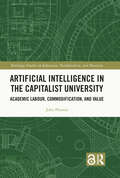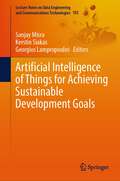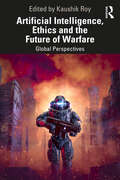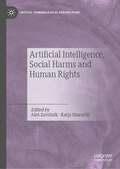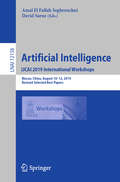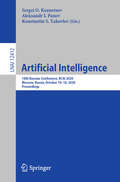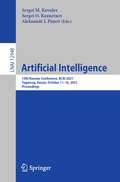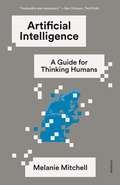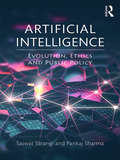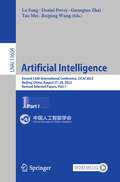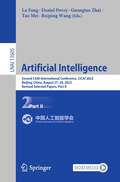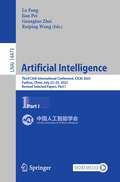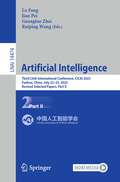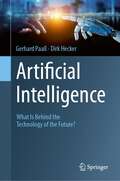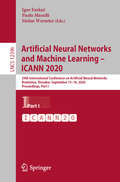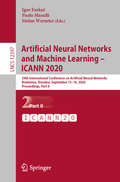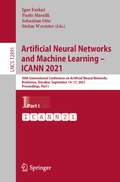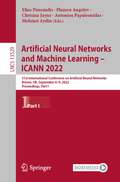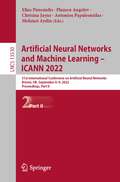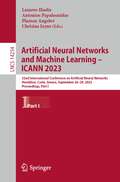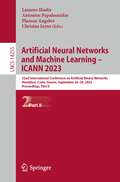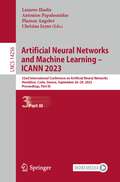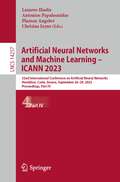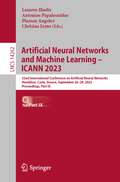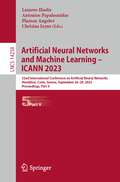- Table View
- List View
Artificial Intelligence in the Capitalist University: Academic Labour, Commodification, and Value (Routledge Studies in Education, Neoliberalism, and Marxism)
by John PrestonUsing Marxist critique, this book explores manifestations of Artificial Intelligence (AI) in Higher Education and demonstrates how it contributes to the functioning and existence of the capitalist university. Challenging the idea that AI is a break from previous capitalist technologies, the book offers nuanced examination of the impacts of AI on the control and regulation of academic work and labour, on digital learning and remote teaching, and on the value of learning and knowledge. Applying a Marxist perspective, Preston argues that commodity fetishism, surveillance, and increasing productivity ushered in by the growth of AI, further alienates and exploits academic labour and commodifies learning and research. The text puts forward a solid theoretical framework and methodology for thinking about AI to inform critical and revolutionary pedagogies. Offering an impactful and timely analysis, this book provides a critical engagement and application of key Marxist concepts in the study of AI’s role in Higher Education. It will be of interest to those working or researching in Higher Education.
Artificial Intelligence of Things for Achieving Sustainable Development Goals (Lecture Notes on Data Engineering and Communications Technologies #192)
by Sanjay Misra Kerstin Siakas Georgios LampropoulosThis book covers various topics and trends regarding Artificial Intelligence (AI), Internet of Things (IoT), and their applications in society, industry, and environment for achieving Sustainable Development Goals (SDGs) suggested by the United Nations. Additionally, it discusses their advancements and fusion as well as the realization of Artificial Intelligence of Things (AIoT). The book aims to provide an overview and recent research into the fusion, integration, advancements, and impact of these technologies in the context of SDGs achievement. The topics include the applications of AI, IoT, big data, AI-based and IoT-based cloud computing, machine learning and deep learning techniques, and blockchain among others for achieving SDGs. It also presents findings and discussions on potential application domains, addresses open issues and challenges, offers solutions, and provides suggestions for future research for achieving SDGs. The chapters are clustered, according to particular SDGsor areas of focus, into: i) the realization of AIoT for SDGs, ii) the role of AIoT in achieving society and wellbeing-related SDGs, iii) the fulfillment of industrial sectors, infrastructure, and economy-related SDGs through AIoT, and iv) the use of AIoT to aid natural resources and environment-related SDGs. The book assists researchers, practitioners, professionals, and academicians of various scientific fields in exploring and better understanding these state-of-the-art technologies, their advancements, impact, future potentials and benefits, and their role in successfully achieving SDGs.The book:· Offers an in-depth overview of AIoT for achieving SDGs.· Presents the fusion of AI and IoT for bringing a significant change in everyday life and fulfilling SDGs.· Highlights innovative solutions and results of AIoT integration in several domains for achieving SDGs.· Showcases the influence of AIoT on promoting and improving sustainability in the context of SDGs.· Discusses the issues, benefits, solutions, and impact of AIoT in society, industry, and environment for achieving SDGs.
Artificial Intelligence, Ethics and the Future of Warfare: Global Perspectives
by Kaushik RoyThis volume examines how the adoption of AI technologies is likely to impact strategic and operational planning, and the possible future tactical scenarios for conventional, unconventional, cyber, space and nuclear force structures. In addition to developments in the USA, Britain, Russia and China, the volume also explores how different Asian and European countries are actively integrating AI into their military readiness. It studies the effect of AI and related technologies in training regimens and command structures. The book also covers the ethical and legal aspects of AI augmented warfare.The volume will be of great interest to scholars, students and researchers of military and strategic studies, defence studies, artificial intelligence and ethics.
Artificial Intelligence, Social Harms and Human Rights (Critical Criminological Perspectives)
by Aleš Završnik Katja SimončičThis book critically explores how and to what extent artificial intelligence (AI) can infringe human rights and/or lead to socially harmful consequences and how to avoid these. The European Union has outlined how it will use big data, machine learning, and AI to tackle a number of inherently social problems, including poverty, climate change, social inequality and criminality. The contributors of this book argue that the developments in AI must take place in an appropriate legal and ethical framework and they make recommendations to ensure that harm and human rights violations are avoided. The book is split into two parts: the first addresses human rights violations and harms that may occur in relation to AI in different domains (e.g. border control, surveillance, facial recognition) and the second part offers recommendations to address these issues. It draws on interdisciplinary research and speaks to policy-makers and criminologists, sociologists, scholars in STS studies, security studies scholars and legal scholars.
Artificial Intelligence. IJCAI 2019 International Workshops: Macao, China, August 10–12, 2019, Revised Selected Best Papers (Lecture Notes in Computer Science #12158)
by Amal El Fallah Seghrouchni David SarneThis book presents selected papers of 12 Workshops held in conjunction with the 28th International Joint Conference on Artificial Intelligence, IJCAI 2019, in Macao, China, in August 2019.The workshops included in this volume are: AI4KM 2019: 7th International Workshop on Artificial Intelligence for Knowledge Management and Innovation.FinNLP 2019: First International Workshop on Financial Technology and Natural Language Processing.OR 2019: 32nd International Workshop on Qualitative Reasoning.SURL 2019: Second International Workshop on Scaling-Up Reinforcement Learning.First International Workshop on Bringing Semantic Knowledge into Vision and Text Understanding.EASyHAT 2019: First International Workshop on Evaluation of Adaptive Systems for Human-Autonomy Teaming.ACAN 2019: 12th International Workshop on Agent-based Complex Automated Negotiations.First International Workshop on Deep Learning for Human Activity Recognition.HAI 2019: Second International Workshop on Humanizing AI.International Workshop on Language Sense on Computer.AISafety 2019: International Workshop on Artificial Intelligence Safety.DeLBP 2019: 4th International Workshop on Declarative Learning Based Programming.
Artificial Intelligence: 18th Russian Conference, RCAI 2020, Moscow, Russia, October 10–16, 2020, Proceedings (Lecture Notes in Computer Science #12412)
by Sergei O. Kuznetsov Aleksandr I. Panov Konstantin S. YakovlevThis book constitutes the proceedings of the 18th Russian Conference on Artificial Intelligence, RCAI 2020, held in Moscow, Russia, in October 2020. The 27 full papers and 8 short papers presented in this volume were carefully reviewed and selected from 140 submissions. The conference deals with a wide range of topics, including data mining and knowledge discovery, text mining, reasoning, decisionmaking, natural language processing, vision, intelligent robotics, multi-agent systems,machine learning, AI in applied systems, and ontology engineering.
Artificial Intelligence: 19th Russian Conference, RCAI 2021, Taganrog, Russia, October 11–16, 2021, Proceedings (Lecture Notes in Computer Science #12948)
by Sergei O. Kuznetsov Aleksandr I. Panov Sergei M. KovalevThis book constitutes the proceedings of the 19th Russian Conference on Artificial Intelligence, RCAI 2021, held in Moscow, Russia, in October 2021. The 19 full papers and 7 short papers presented in this volume were carefully reviewed and selected from 80 submissions. The conference deals with a wide range of topics, categorized into the following topical headings: cognitive research; data mining, machine learning, classification; knowledge engineering; multi-agent systems and robotics; natural language processing; fuzzy models and soft computer; intelligent systems; and tools for designing intelligent systems.
Artificial Intelligence: A Guide for Thinking Humans (Pelican Bks.)
by Melanie MitchellNo recent scientific enterprise has proved as alluring, terrifying, and filled with extravagant promise and frustrating setbacks as artificial intelligence. The award-winning author Melanie Mitchell, a leading computer scientist, now reveals AI’s turbulent history and the recent spate of apparent successes, grand hopes, and emerging fears surrounding it.In Artificial Intelligence, Mitchell turns to the most urgent questions concerning AI today: How intelligent—really—are the best AI programs? How do they work? What can they actually do, and when do they fail? How humanlike do we expect them to become, and how soon do we need to worry about them surpassing us? Along the way, she introduces the dominant models of modern AI and machine learning, describing cutting-edge AI programs, their human inventors, and the historical lines of thought underpinning recent achievements. She meets with fellow experts such as Douglas Hofstadter, the cognitive scientist and Pulitzer Prize–winning author of the modern classic Gödel, Escher, Bach, who explains why he is “terrified” about the future of AI. She explores the profound disconnect between the hype and the actual achievements in AI, providing a clear sense of what the field has accomplished and how much further it has to go. Interweaving stories about the science of AI and the people behind it, Artificial Intelligence brims with clear-sighted, captivating, and accessible accounts of the most interesting and provocative modern work in the field, flavored with Mitchell’s humor and personal observations. This frank, lively book is an indispensable guide to understanding today’s AI, its quest for “human-level” intelligence, and its impact on the future for us all.
Artificial Intelligence: Evolution, Ethics and Public Policy
by Pankaj Sharma Saswat SarangiWhat will the future be? A dystopian landscape controlled by machines or a brave new world full of possibilities? Perhaps the answer lies with Artificial Intelligence (AI)—a phenomenon much beyond technology that has, continues to, and will shape lives in ways we do not understand yet. This book traces the evolution of AI in contemporary history. It analyses how AI is primarily being driven by "capital" as the only "factor of production" and its consequences for the global political economy. It further explores the dystopian prospect of mass unemployment by AI and takes up the ethical aspects of AI and its possible use in undermining natural and fundamental rights. A tract for the times, this volume will be a major intervention in an area that is heavily debated but rarely understood. It will be essential reading for researchers and students of digital humanities, politics, economics, science and technology studies, physics, and computer science. It will also be key reading for policy makers, cyber experts and bureaucrats.
Artificial Intelligence: Second CAAI International Conference, CICAI 2022, Beijing, China, August 27–28, 2022, Revised Selected Papers, Part I (Lecture Notes in Computer Science #13604)
by Guangtao Zhai Tao Mei Lu Fang Ruiping Wang Daniel PoveyThis three-volume set LNCS 13604-13606 constitutes revised selected papers presented at the Second CAAI International Conference on Artificial Intelligence, held in Beijing, China, in August 2022. CICAI is a summit forum in the field of artificial intelligence and the 2022 forum was hosted by Chinese Association for Artificial Intelligence (CAAI).The 164 papers were thoroughly reviewed and selected from 521 submissions. CICAI aims to establish a global platform for international academic exchange, promote advanced research in AI and its affiliated disciplines such as machine learning, computer vision, natural language, processing, and data mining, amongst others.
Artificial Intelligence: Second CAAI International Conference, CICAI 2022, Beijing, China, August 27–28, 2022, Revised Selected Papers, Part II (Lecture Notes in Computer Science #13605)
by Guangtao Zhai Tao Mei Lu Fang Ruiping Wang Daniel PoveyThis three-volume set LNCS 13604-13606 constitutes revised selected papers presented at the Second CAAI International Conference on Artificial Intelligence, held in Beijing, China, in August 2022. CICAI is a summit forum in the field of artificial intelligence and the 2022 forum was hosted by Chinese Association for Artificial Intelligence (CAAI). The 164 papers were thoroughly reviewed and selected from 521 submissions. CICAI aims to establish a global platform for international academic exchange, promote advanced research in AI and its affiliated disciplines such as machine learning, computer vision, natural language, processing, and data mining, amongst others.
Artificial Intelligence: Third CAAI International Conference, CICAI 2023, Fuzhou, China, July 22–23, 2023, Revised Selected Papers, Part I (Lecture Notes in Computer Science #14473)
by Guangtao Zhai Jian Pei Lu Fang Ruiping WangThis two-volume set LNAI 14473-14474 constitutes revised selected papers presented at the Third CAAI International Conference, CICAI 2023, in Fuzhou, China, in July 2023. CICAI is a summit forum in the field of artificial intelligence and the 2023 forum was hosted by Chinese Association for Artificial Intelligence (CAAI). The 100 papers were thoroughly reviewed and selected from 376 submissions. CICAI 2023 conference covers a wide range of of AI generated content, computer vision, machine learning, nature language processing, application of AI, and data mining, amongst others.
Artificial Intelligence: Third CAAI International Conference, CICAI 2023, Fuzhou, China, July 22–23, 2023, Revised Selected Papers, Part II (Lecture Notes in Computer Science #14474)
by Guangtao Zhai Jian Pei Lu Fang Ruiping WangThis two-volume set LNAI 14473-14474 constitutes revised selected papers presented at the Third CAAI International Conference, CICAI 2023, in Fuzhou, China, in July 2023. CICAI is a summit forum in the field of artificial intelligence and the 2023 forum was hosted by Chinese Association for Artificial Intelligence (CAAI). The 100 papers were thoroughly reviewed and selected from 376 submissions. CICAI 2023 conference covers a wide range of of AI generated content, computer vision, machine learning, nature language processing, application of AI, and data mining, amongst others.
Artificial Intelligence: What Is Behind the Technology of the Future?
by Gerhard Paaß Dirk HeckerArtificial Intelligence (AI) is already present in our daily routines, and in the future, we will encounter it in almost every aspect of life – from analyzing X-rays for medical diagnosis, driving autonomous cars, maintaining complex machinery, to drafting essays on environmental problems and drawing imaginative pictures. The potentials of AI are enormous, while at the same time many myths, uncertainties and challenges circulate that need to be tackled. The English translation of the book “Künstliche Intelligenz – Was steckt hinter der Technologie der Zukunft?” originally published in German (Springer Vieweg, 2020), this book is addressed to the general public, from interested citizens to corporate executives who want to develop a better and deeper understanding of AI technologies and assess their consequences. Mathematical basics, terminology, and methods are explained in understandable language. Adaptations to different media such as images, text, and speech and the corresponding generative models are introduced. A concluding discussion of opportunities and challenges helps readers evaluate new developments, demystify them, and assess their relevance for the future.
Artificial Neural Networks and Machine Learning – ICANN 2020: 29th International Conference on Artificial Neural Networks, Bratislava, Slovakia, September 15–18, 2020, Proceedings, Part I (Lecture Notes in Computer Science #12396)
by Paolo Masulli Stefan Wermter Igor FarkašThe proceedings set LNCS 12396 and 12397 constitute the proceedings of the 29th International Conference on Artificial Neural Networks, ICANN 2020, held in Bratislava, Slovakia, in September 2020.*The total of 139 full papers presented in these proceedings was carefully reviewed and selected from 249 submissions. They were organized in 2 volumes focusing on topics such as adversarial machine learning, bioinformatics and biosignal analysis, cognitive models, neural network theory and information theoretic learning, and robotics and neural models of perception and action. *The conference was postponed to 2021 due to the COVID-19 pandemic.
Artificial Neural Networks and Machine Learning – ICANN 2020: 29th International Conference on Artificial Neural Networks, Bratislava, Slovakia, September 15–18, 2020, Proceedings, Part II (Lecture Notes in Computer Science #12397)
by Paolo Masulli Stefan Wermter Igor FarkašThe proceedings set LNCS 12396 and 12397 constitute the proceedings of the 29th International Conference on Artificial Neural Networks, ICANN 2020, held in Bratislava, Slovakia, in September 2020.*The total of 139 full papers presented in these proceedings was carefully reviewed and selected from 249 submissions. They were organized in 2 volumes focusing on topics such as adversarial machine learning, bioinformatics and biosignal analysis, cognitive models, neural network theory and information theoretic learning, and robotics and neural models of perception and action. *The conference was postponed to 2021 due to the COVID-19 pandemic.
Artificial Neural Networks and Machine Learning – ICANN 2021: 30th International Conference on Artificial Neural Networks, Bratislava, Slovakia, September 14–17, 2021, Proceedings, Part I (Lecture Notes in Computer Science #12891)
by Paolo Masulli Stefan Wermter Igor Farkaš Sebastian OtteThe proceedings set LNCS 12891, LNCS 12892, LNCS 12893, LNCS 12894 and LNCS 12895 constitute the proceedings of the 30th International Conference on Artificial Neural Networks, ICANN 2021, held in Bratislava, Slovakia, in September 2021.* The total of 265 full papers presented in these proceedings was carefully reviewed and selected from 496 submissions, and organized in 5 volumes.In this volume, the papers focus on topics such as adversarial machine learning, anomaly detection, attention and transformers, audio and multimodal applications, bioinformatics and biosignal analysis, capsule networks and cognitive models. *The conference was held online 2021 due to the COVID-19 pandemic.
Artificial Neural Networks and Machine Learning – ICANN 2022: 31st International Conference on Artificial Neural Networks, Bristol, UK, September 6–9, 2022, Proceedings, Part I (Lecture Notes in Computer Science #13529)
by Plamen Angelov Elias Pimenidis Chrisina Jayne Antonios Papaleonidas Mehmet AydinThe 4-volumes set of LNCS 13529, 13530, 13531, and 13532 constitutes the proceedings of the 31st International Conference on Artificial Neural Networks, ICANN 2022, held in Bristol, UK, in September 2022. The total of 255 full papers presented in these proceedings was carefully reviewed and selected from 561 submissions. ICANN 2022 is a dual-track conference featuring tracks in brain inspired computing and machine learning and artificial neural networks, with strong cross-disciplinary interactions and applications.
Artificial Neural Networks and Machine Learning – ICANN 2022: 31st International Conference on Artificial Neural Networks, Bristol, UK, September 6–9, 2022, Proceedings, Part II (Lecture Notes in Computer Science #13530)
by Plamen Angelov Elias Pimenidis Chrisina Jayne Antonios Papaleonidas Mehmet AydinThe 4-volumes set of LNCS 13529, 13530, 13531, and 13532 constitutes the proceedings of the 31st International Conference on Artificial Neural Networks, ICANN 2022, held in Bristol, UK, in September 2022. The total of 255 full papers presented in these proceedings was carefully reviewed and selected from 561 submissions. ICANN 2022 is a dual-track conference featuring tracks in brain inspired computing and machine learning and artificial neural networks, with strong cross-disciplinary interactions and applications.
Artificial Neural Networks and Machine Learning – ICANN 2023: 32nd International Conference on Artificial Neural Networks, Heraklion, Crete, Greece, September 26–29, 2023, Proceedings, Part I (Lecture Notes in Computer Science #14254)
by Plamen Angelov Chrisina Jayne Lazaros Iliadis Antonios PapaleonidasThe 10-volume set LNCS 14254-14263 constitutes the proceedings of the 32nd International Conference on Artificial Neural Networks and Machine Learning, ICANN 2023, which took place in Heraklion, Crete, Greece, during September 26–29, 2023.The 426 full papers, 9 short papers and 9 abstract papers included in these proceedings were carefully reviewed and selected from 947 submissions. ICANN is a dual-track conference, featuring tracks in brain inspired computing on the one hand, and machine learning on the other, with strong cross-disciplinary interactions and applications.
Artificial Neural Networks and Machine Learning – ICANN 2023: 32nd International Conference on Artificial Neural Networks, Heraklion, Crete, Greece, September 26–29, 2023, Proceedings, Part II (Lecture Notes in Computer Science #14255)
by Plamen Angelov Chrisina Jayne Lazaros Iliadis Antonios PapaleonidasThe 10-volume set LNCS 14254-14263 constitutes the proceedings of the 32nd International Conference on Artificial Neural Networks and Machine Learning, ICANN 2023, which took place in Heraklion, Crete, Greece, during September 26–29, 2023.The 426 full papers, 9 short papers and 9 abstract papers included in these proceedings were carefully reviewed and selected from 947 submissions. ICANN is a dual-track conference, featuring tracks in brain inspired computing on the one hand, and machine learning on the other, with strong cross-disciplinary interactions and applications.
Artificial Neural Networks and Machine Learning – ICANN 2023: 32nd International Conference on Artificial Neural Networks, Heraklion, Crete, Greece, September 26–29, 2023, Proceedings, Part III (Lecture Notes in Computer Science #14256)
by Plamen Angelov Chrisina Jayne Lazaros Iliadis Antonios PapaleonidasThe 10-volume set LNCS 14254-14263 constitutes the proceedings of the 32nd International Conference on Artificial Neural Networks and Machine Learning, ICANN 2023, which took place in Heraklion, Crete, Greece, during September 26–29, 2023.The 426 full papers, 9 short papers and 9 abstract papers included in these proceedings were carefully reviewed and selected from 947 submissions. ICANN is a dual-track conference, featuring tracks in brain inspired computing on the one hand, and machine learning on the other, with strong cross-disciplinary interactions and applications.
Artificial Neural Networks and Machine Learning – ICANN 2023: 32nd International Conference on Artificial Neural Networks, Heraklion, Crete, Greece, September 26–29, 2023, Proceedings, Part IV (Lecture Notes in Computer Science #14257)
by Plamen Angelov Chrisina Jayne Lazaros Iliadis Antonios PapaleonidasThe 10-volume set LNCS 14254-14263 constitutes the proceedings of the 32nd International Conference on Artificial Neural Networks and Machine Learning, ICANN 2023, which took place in Heraklion, Crete, Greece, during September 26–29, 2023.The 426 full papers, 9 short papers and 9 abstract papers included in these proceedings were carefully reviewed and selected from 947 submissions. ICANN is a dual-track conference, featuring tracks in brain inspired computing on the one hand, and machine learning on the other, with strong cross-disciplinary interactions and applications.
Artificial Neural Networks and Machine Learning – ICANN 2023: 32nd International Conference on Artificial Neural Networks, Heraklion, Crete, Greece, September 26–29, 2023, Proceedings, Part IX (Lecture Notes in Computer Science #14262)
by Plamen Angelov Chrisina Jayne Lazaros Iliadis Antonios PapaleonidasThe 10-volume set LNCS 14254-14263 constitutes the proceedings of the 32nd International Conference on Artificial Neural Networks and Machine Learning, ICANN 2023, which took place in Heraklion, Crete, Greece, during September 26–29, 2023.The 426 full papers and 9 short papers included in these proceedings were carefully reviewed and selected from 947 submissions. ICANN is a dual-track conference, featuring tracks in brain inspired computing on the one hand, and machine learning on the other, with strong cross-disciplinary interactions and applications.
Artificial Neural Networks and Machine Learning – ICANN 2023: 32nd International Conference on Artificial Neural Networks, Heraklion, Crete, Greece, September 26–29, 2023, Proceedings, Part V (Lecture Notes in Computer Science #14258)
by Plamen Angelov Chrisina Jayne Lazaros Iliadis Antonios PapaleonidasThe 10-volume set LNCS 14254-14263 constitutes the proceedings of the 32nd International Conference on Artificial Neural Networks and Machine Learning, ICANN 2023, which took place in Heraklion, Crete, Greece, during September 26–29, 2023.The 426 full papers, 9 short papers and 9 abstract papers included in these proceedings were carefully reviewed and selected from 947 submissions. ICANN is a dual-track conference, featuring tracks in brain inspired computing on the one hand, and machine learning on the other, with strong cross-disciplinary interactions and applications.
